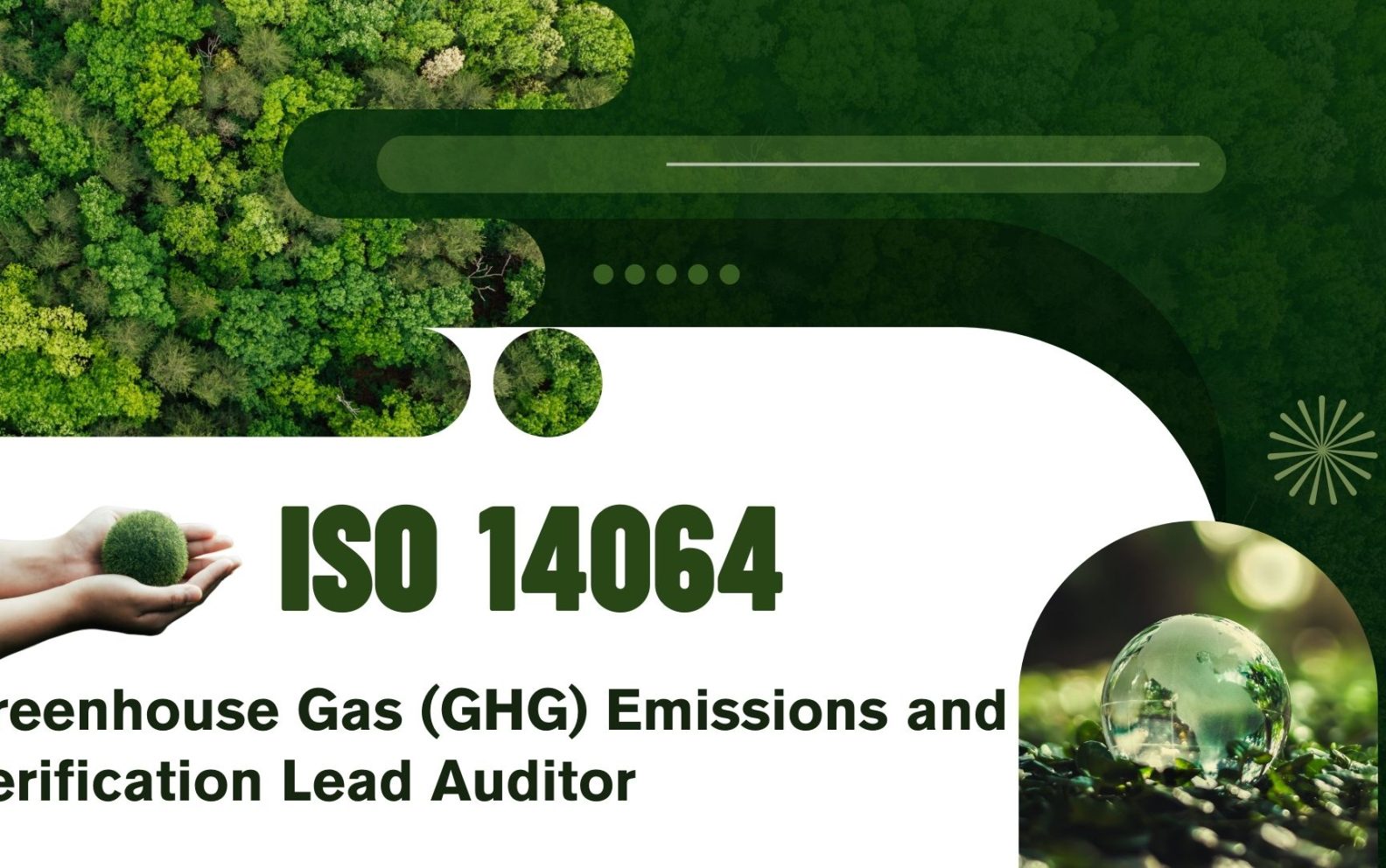
ISO 14064 Greenhouse Gas (GHG) Emissions and Verification Lead Auditor
- Internationally Recognized Certification: Upon successful completion, you will receive the ISO 14064 Lead Auditor certification, widely recognized by employers globally.
- Enhanced Career Opportunities: Elevate your career in environmental auditing, sustainability consulting, and GHG emissions verification.
- Practical, Hands-On Learning: Apply real-world case studies and projects to gain direct experience in GHG inventory development and verification.
- Credibility and Networking: Network with industry professionals and connect with organizations focused on sustainability and environmental management.
- Increase Organizational Value: Learn how to help organizations meet regulatory requirements, improve sustainability practices, and reduce carbon footprints.
- Demonstrate a thorough understanding of the ISO 14064 standard for GHG emissions management and verification.
- Develop and manage GHG inventories, ensuring accuracy and transparency in emissions reporting.
- Apply the principles of GHG quantification, including the use of emission factors and data collection methodologies.
- Conduct independent verification of GHG emissions data and assertions in compliance with ISO 14064 Part 3.
- Lead GHG audits, identifying discrepancies, errors, and areas for improvement in organizational GHG inventories.
- Prepare comprehensive GHG verification reports, offering actionable recommendations to organizations.
- Support organizations in achieving sustainability and compliance with global GHG emissions standards.
- Module 1: Introduction to ISO 14064 and GHG Emissions Management
- Key concepts in GHG emissions
- Overview of ISO 14064 standards
- Module 2: Organizational GHG Inventories (ISO 14064 Part 1)
- Identifying emission sources and boundaries
- Quantification techniques for GHG emissions
- Module 3: GHG Reporting and Documentation
- GHG inventory structure and best practices
- Documentation, exclusions, and adjustments
- Module 4: GHG Verification Process (ISO 14064 Part 3)
- Verification methodologies and process
- Preparing a verification report
- Module 5: Leading GHG Audits
- Planning and executing GHG audits
- Identifying and addressing discrepancies
- Module 6: Practical Application and Case Studies
- Developing a GHG inventory and performing a verification
- Real-world case studies of GHG emissions management
- Environmental Auditor: Lead audits of GHG emissions for private or public sector organizations.
- Sustainability Manager: Oversee and manage sustainability programs, including carbon reduction initiatives.
- Compliance Officer: Ensure organizations adhere to national and international GHG emissions regulations.
- GHG Consultant: Provide expert advice on managing GHG emissions and developing carbon reduction strategies.
- Regulatory Auditor: Work within government agencies to monitor compliance with environmental laws and sustainability programs.
- Further Skill Enhancement:
- To further enhance their expertise and career prospects, participants can consider the following steps:
- Pursue Additional Certifications:
- ISO 14001 Environmental Management System (EMS) Auditor: This certification will help broaden your skill set in environmental management and auditing, allowing you to assess broader sustainability practices beyond GHG emissions.
- NEBOSH Environmental Management Certificate: Gain further understanding of environmental risk management and safety, complementing your GHG expertise.
- Certified Energy Manager (CEM): Specialize in energy management and efficiency, which is closely related to GHG emissions reduction.
- Engage in Continuous Learning:
- Stay updated on the latest GHG emissions regulations and reporting standards by attending webinars, conferences, and workshops focused on environmental sustainability.
- Enroll in specialized courses related to climate change, carbon footprint analysis, and sustainable business practices.
- Gain Practical Experience:
- Volunteer or work with organizations focused on sustainability, renewable energy, or environmental consulting to gain hands-on experience.
- Participate in GHG verification and carbon reduction projects to apply your skills in real-world scenarios.
- Develop Leadership Skills:
- Enhance your leadership and management skills by undertaking training in project management or organizational leadership to take on more senior roles like sustainability director or chief sustainability officer.
- Join Professional Associations:
- Become a member of professional bodies such as the International Register of Certificated Auditors (IRCA), Environmental Protection Agency (EPA), or Green Building Councils to network with other professionals, access exclusive resources, and stay at the forefront of industry trends.
- Pursue a Master’s or Advanced Degree:
- Consider pursuing a Master’s degree in Sustainability Management, Environmental Science, or Climate Change Policy to gain an advanced understanding of global environmental challenges and sustainability solutions.
- Expert Instructors: Our trainers are highly experienced professionals with extensive backgrounds in ISO 14064, GHG emissions management, and environmental auditing.
- Comprehensive Learning Experience: We provide a mix of theoretical knowledge and practical, hands-on learning opportunities.
- International Certification: Our certification is recognized worldwide, opening opportunities for professional growth and industry recognition.
- Flexible Learning Options: Choose between in-person, live online, or self-paced learning to suit your schedule and preferences.
- Proven Success: We have helped hundreds of professionals advance their careers by providing top-tier training programs in environmental management and sustainability.
Study Units:
- Introduction to ISO 14064 and GHG Emissions Management
- Overview of ISO 14064 and its significance
- Introduction to GHG emissions and their impact on the environment
- Organizational GHG Inventories (ISO 14064 Part 1)
- Defining organizational boundaries and emission sources
- Quantification of GHG emissions using emission factors and methodologies
- GHG Reporting and Documentation
- Structuring a GHG inventory report
- Managing exclusions, adjustments, and uncertainties in reporting
- GHG Verification Process (ISO 14064 Part 3)
- Principles of verification and assurance levels
- Assessing GHG assertions and evaluating data accuracy
- Leading GHG Audits
- Planning and conducting GHG audits
- Identifying and addressing discrepancies in GHG data
- Practical Application and Case Studies
- Hands-on exercises: Developing GHG inventories and conducting verification audits
- Real-world case studies and best practices in GHG emissions management
Upon successful completion of the ISO 14064 Lead Auditor course, participants will be able to demonstrate the following professional competencies:
Audit Leadership:
Lead GHG verification audits effectively, following ISO 14064 and ISO 19011 guidelines for environmental auditing.GHG Quantification and Reporting:
Apply GHG quantification methodologies, emission factors, and boundary definitions to develop accurate GHG inventories.Verification and Assurance:
Conduct third-party verification of GHG emissions data and organizational assertions to ensure transparency and credibility.Risk Evaluation and Data Integrity:
Assess data quality, identify inconsistencies, and evaluate uncertainty in GHG reporting and verification statements.Corrective and Preventive Actions:
Identify data errors or non-conformities, recommend corrective actions, and verify their implementation.Communication and Reporting:
Prepare clear, evidence-based verification reports and effectively communicate findings to clients and regulatory bodies.Regulatory and Framework Awareness:
Demonstrate knowledge of key international climate reporting mechanisms (e.g., UNFCCC, GHG Protocol, and Carbon Disclosure frameworks).Stakeholder and Team Leadership:
Manage verification teams and coordinate with internal and external stakeholders to ensure successful audit outcomes.Continuous Improvement:
Support organizations in improving GHG management systems and achieving long-term carbon reduction and sustainability goals.
This course is designed for professionals aiming to specialize in auditing, verifying, and managing greenhouse gas (GHG) emissions in line with international environmental and sustainability standards. It is ideal for:
Environmental and Sustainability Professionals: Seeking to strengthen their expertise in GHG quantification, verification, and compliance auditing.
Internal and External Auditors: Looking to qualify as ISO 14064 Lead Auditors to perform independent GHG verification and assurance.
Carbon and Climate Change Consultants: Providing organizations with strategies for carbon footprint reduction and reporting.
Compliance and Regulatory Officers: Responsible for ensuring adherence to national and international GHG and climate reporting frameworks.
Corporate Sustainability Managers: Leading GHG emission monitoring, reporting, and verification (MRV) initiatives within organizations.
Energy and Environmental Engineers: Involved in data collection, emissions measurement, and carbon reduction projects.
Professionals Pursuing Career Growth: Aspiring to leadership roles in sustainability consulting, carbon management, or environmental auditing.
Our assessment process is designed to ensure every learner achieves the required level of knowledge, skills, and understanding outlined in each course unit.
Purpose of Assessment
Assessment helps measure how well a learner has met the learning outcomes. It ensures consistency, quality, and fairness across all learners.
What Learners Need to Do
Learners must provide clear evidence that shows they have met all the learning outcomes and assessment criteria for each unit. This evidence can take different forms depending on the course and type of learning.
Types of Acceptable Evidence
Assignments, reports, or projects
Worksheets or written tasks
Portfolios of practical work
Answers to oral or written questions
Test or exam papers
Understanding the Structure
Learning outcomes explain what learners should know, understand, or be able to do.
Assessment criteria set the standard learners must meet to achieve each learning outcome.
Assessment Guidelines
All assessment must be authentic, current, and relevant to the unit.
Evidence must match each assessment criterion clearly.
Plagiarism or copied work is not accepted.
All learners must complete assessments within the given timelines.
Where applicable, assessments may be reviewed or verified by internal or external quality assurers.
Full learning outcomes and assessment criteria for each qualification are available from page 8 of the course handbook.
Top Courses
Related Courses
Let's Get in touch
Deleting Course Review
Course Access
This course is password protected. To access it please enter your password below:

